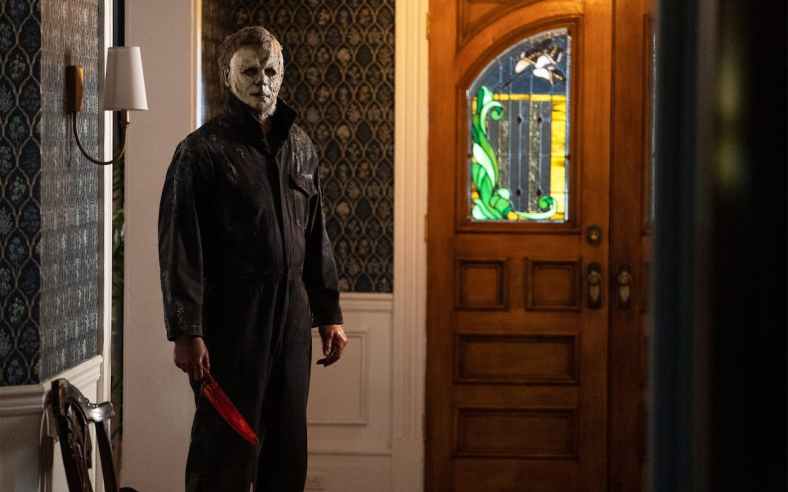Evil Stayed Home: ‘Halloween Ends’ One Year Later

One year ago, David Gordon Green and collaborator (and co-writer) Danny McBride wrapped their revitalized Halloween series. With Halloween Ends, the legacy trilogy ends Laurie Strode and Michael Myers’ perennial battle (for the fourth time if you’re counting Rob Zombie’s remakes). The reception was broadly mixed, with 2018’s Halloween premiering to both critical and commercial acclaim (Dread Central loved it), while subsequent entries performed progressively worse by both metrics. On the heels of Green’s upcoming The Exorcist legacy sequel, itself planned as the first part in a trilogy, it’s worth interrogating Green’s first stab at revitalizing an icon and carving out an identity in an ever-crowded horror, and legacy sequel, space.
Importantly, with a little time, it’s worth noting that I’ve come around to Green and McBride’s vision for post-Millennium Michael Myers. While I maintain, parallel with our own Josh Korngut, that Green and company fundamentally misread their source material in a few key areas, I’ve come to accept the movies for what they are, not what I hoped they might be.
After all, Michael Myers is part and parcel with the horror genre itself, and truthfully, part and parcel with my own horror fandom. I’ve contended it to be the perfect gateway to more mature horror fare, done a franchise retrospective, and even ingratiated myself into the world of Halloween fan films. Reasonably, it might be my favorite slasher franchise, and that includes Scream (painful as that is for me to admit). It isn’t perfect, though that’s a large part of its charm. I love the random shifts to supernaturalism, the cultists, and prison escapes. I love Michael’s incredulously inconsistent mask design almost as much as I love his brutal physicality (and grunting) in Rob Zombie’s remakes.
Also Read: Show Your Kids ‘Halloween’ This Year
The franchise has always been weird. For as much as Green’s original sequel is credited with getting the series back to basics, it’s gonzo and uncanny in its own right. Laurie Strode (Jamie Lee Curtis) is a survivalist with a predilection for strawberry milk. The finale has Laurie, her daughter Karen (Judy Greer), and granddaughter, Allyson (Andi Matichak) trap Michael in a makeshift cage before setting him ablaze. It’s a gangbuster, crowd-pleasing ending, sure. But it’s unconventional, even in a franchise where Halloween 6 exists.

Wisely, however, Green at least endeavored from inception to strip away much of the convoluted mythology, most notably excising the Myers/Strode sibling angle that Carpenter himself even regrets. Yet, while Green removed much of what had been plaguing the franchise for decades, he simultaneously imbued his Halloween with so much hooey, that it undermined itself for distinctly different reasons. Green’s trauma-informed filmmaking is disingenuous at best, and outright offensive at worst. I’ve written before that Halloween Kills’ handling of Karen Strode was the nail in the trilogy’s aspirational, thematic coffin, and Ends fares just as poorly as an exercise in colloquial “trauma” horror. It’s precisely the kind we’re seeing more and more of today, undoubtedly on account of Halloween 2018’s success.
Rohan Campbell’s Corey Cunningham is Halloween Ends’ Karen Strode, a textured, dimensional character easily disposed of with little resolution. Where Karen’s narrative throughline from traumatized child to Myers victim is ill-conceived, so too is Corey’s role as Myers acolyte. He dons the mask, rebels against a community that rejected him, and is swiftly killed to make way for a final, perfunctory showdown between Laurie and Michael. It’s an orange and black cake that Green wanted and ate, too.
Also Read: It’s Scary Out There: Halloween Horror Nights 32 Preview
However, to call the trilogy an outright failure, despite its glaring flaws, would still be too easy an assessment. For starters, Green’s trilogy is the best the series has looked since the original, adroitly matching Carpenter’s own soft, indie sensibilities. And the mask, a critical variable, is arguably the best there is, even after it’s burned away and decayed in later entries. And Halloween Ends, for all its faults, is still a better capstone for Laurie Strode than Halloween: Resurrection. But it’s not better than Halloween H20, that much I need to make clear.
With his trilogy, Green rendered The Shape a metatextual slasher icon. Green wasn’t just interrogating the nature of horror with his whizzed-up Michael Myers, but also the nature of the franchise itself. Michael Myers has been and meant many things over the decades, and 40 years after the original, Green was gutsy enough to explore what that really means. Is he the boogeyman? A facsimile of suburban evil? A curse? Why not all of that and also none of that, together, at the same time? Green refuses to commit to any conceit long enough for it to matter. But in doing so, he invites the audience to project their own identities onto Michael as a slasher icon. He is, in other words, whatever the audience wants him to be. With as storied a history as he has, there was no other choice.
Also Read: ‘Natty Knocks’ Trailer: From The Director of ‘Halloween 4’ Comes A Twisted New Slasher
While I won’t go so far as to say Green’s trilogy has been unfairly assessed—it’s both fair and reasonable that the wide reception from fans and audiences alike is critical—it is worth evaluating on its own terms. It’s weird, bold, and stylish, critically taking bigger risks than most longstanding horror IPs. I mean, this is a trilogy whose concluding chapter sidelined its biggest draw. Is it perfect? Far from it. But, it’s a bold vision from an uncompromising filmmaker. With The Exorcist: Believer, it remains unclear whether Halloween will prove to be more the pattern or the exception. One thing is for certain at least: it will have people talking.
As always, I’m available to chat Halloween any day over on Twitter @ChadisCollins.
Categorized:Editorials

